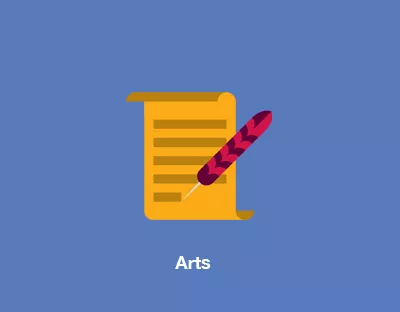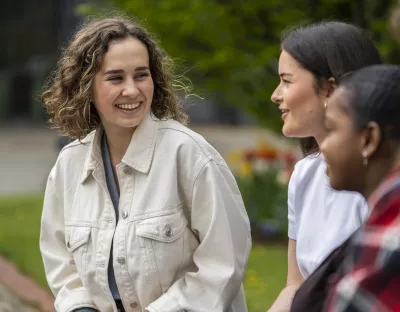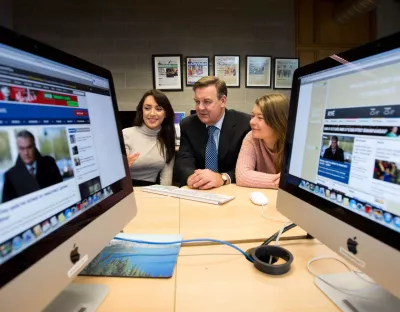Key Info
Digital Culture and Communications
Entry route(s):
Digital Culture and Communications can be taken on both LM002 Bachelor of Arts & LM019 Bachelor of Science in Social Sciences. Subject combinations & course structures can be reviewed on the appropriate programme page.
About you
You want to learn more about media and culture, the individual in society, and to be creative in a challenging world. You are bright, perceptive and curious, good at working on your own but also in a team, keen to express and communicate ideas and opinions. You are interested in a wide range of texts – social media, film, video, TV, books, news. You are open to new ideas, and to the power of words and images to inform, influence and convince.
Why study Digital Culture and Communication at UL?
The development of digital and social media has led to profound changes in our cultural practices. Increasingly, our lives are lived through mediated communication, which makes it even more urgent to examine the relationship between culture, media and technology. The pathway in Digital Culture and Communications is designed to address these challenges and to enable graduates to live and work in the digital present and future. Students will undertake modules which enable them to develop media production and media writing and to develop the critical and analytical skills to examine the relationship between communication, technology and culture.
Learn more about our courses and upcoming events
What you will study
Modules are offered on both Bachelor of Arts (LM002) and BSc. Social Sciences (LM019) - Both are subject to change.
| Year 1 | Semester 1 | Semester 2 | |
|
CS4161 |
Introduction to Digital Media for Arts |
JM4006 |
Social Media and Society |
| Year 2 | Semester 3 | Semester 4 | |
| Students select 1 or 2 depending on their programme of study | Cooperative Education Work Placement | ||
|
CU4027 |
Visual cultural Studies |
||
|
CS4031 |
Introduction to Digital Media |
||
|
TW4003 |
Introduction to Technical Communication |
||
|
SO4033 |
Sociology of the Media |
||
| Year 3 | Semester 5 | Semester 6 | |
| Erasmus/Exchange placement with a partner institution abroad |
Students select 1 or 2 depending on their programme of study |
||
|
CU4116 |
Cultural Studies 4: Cultural Theory |
||
|
CU4026 |
How to Read a Film |
||
|
CU4014 |
Analyzing Media discourse |
||
|
TW4006 |
Writing for New Media |
||
| Year 4 | Semester 7 | Semester 8 | |
| Students select 1 or 2 depending on their programme of study | Students select 1 or 2 depending on their programme of study | ||
|
CU4011 |
Comparative Literature: Crime Fiction as Critical Memory |
CU4018 |
European Cinema post 60's |
|
CU4037 |
European Cinema to the 50's |
CU4006 |
Travel Literature |
|
CU4128 |
New Media, Language and Globalisation |
TW4118 |
Content Development and Information Management |
| JM4052 | Media Challenges in the Digital Age |
Entry requirements
| Additional considerations |
Entry requirements are dependent on your programme of choice. Please click your preferred programme below: For certain subjects, additional special qualifications specific to individual subjects or disciplines may be determined by the respective departments in accordance with Academic Council regulations. Applications are especially welcome from Mature Students. Mature applicants must apply through the Central Applications Office (CAO) by 1 February. QQI Entry Certain QQI Awards are acceptable in fulfilling admission requirements for both LM002 and LM019. More information on the UL Admissions QQI page including a full list of modules. |
|---|---|
| Non-EU Entry Requirements |
|
How to apply
| Where are you applying from? | How to Apply |
|---|---|
| Ireland | Irish students must apply to UL via the CAO. More information can be found here. |
| The UK | Students who have completed their A-Levels can apply to UL via the CAO. More information can be found on the Academic Registry website. |
| The EU | EU Students can apply to UL via the CAO. More information can be found on the Academic Registry website. |
| Non-EU country | If you are outside of the EU, you can apply for this subject through the Bachelor of Arts degree or |
Fees and funding
Student course fees are broken into three components - Student contribution, Student Levy and Tuition Fees.
A number of illustrative examples of fees for this course based on the current fee levels have been set out in the tables below.
An explanation of the components, how to determine status and the criteria involved is provided below the examples as is a list of possible scholarships and funding available.
EU Students with Free fees status in receipt of a SUSI grant
| HEA pays | Tuition Fees | €2,558 |
| SUSI pays | Student contribution | €3,000 |
| Student pays | Student Levy | €102 |
| Total | €5,660 |
EU Students with Free fees status not in receipt of a grant
| HEA pays | Tuition Fees | €2,558 |
| Student pays | Student contribution | €3,000 |
| Student pays | Student Levy | €102 |
| Total | €5,660 |
Students with EU fee status not in receipt of a grant
| Student pays | Tuition Fees | €2,558 |
| Student pays | Student contribution | €3,000 |
| Student pays | Student Levy | €102 |
| Total | €5,660 |
Non-EU Students
| Student pays | Tuition Fees | €16,798 |
| Student pays | Student Levy | €102 |
| Total | €16,900 |
Student course fees are comprised of the following components:
Student Contribution
Annual charge set by the government for all full-time third level students. All students are liable unless they have been approved for a grant by Student Universal Support Ireland (SUSI). Please refer to https://www.studentfinance.ie to determine your eligibility for a grant and for instructions on how to apply. The current student contribution is set at €3000.
Student Levy
All students are liable to pay the Student Levy of €102. Please note the Student Levy is not covered by the SUSI Grant.
Tuition Fees
These are based on Residency, Citizenship, Course requirements.
Review the three groups of criteria to determine your fee status as follows
-
Residency
- You must have been living in an EU/EEA member state or Switzerland for at least 3 of the 5 years before starting your course
-
Citizenship
- You must be a citizen of an EU/EEA member state or Switzerland or have official refugee status
-
Course Requirements
(all must be met)
- You must be a first time full-time undergraduate (Exceptions are provided for students who hold a Level 6 or Level 7 qualification and are progressing to a Level 8 course in the same general area of study).
- You must be undertaking a full-time undergraduate course of at least 2 years' duration
- You cannot be undertaking a repeat year of study at the same level unless evidence of exceptional circumstances eg serious illness is provided (in which case this condition may be waived)
Depending on how you meet these criteria your status will be one of the following -
- Free Fee Status: You satisfy all three categories (1, 2 and 3) and therefore are eligible for the Higher Education Authority’s Free Fees scheme.
- EU Fee Status: You satisfy both the citizenship and residency criteria but fail to satisfy the course requirements and are liable to EU fees.
- Non EU Fee Status: You do not meet either the citizenship or residency criteria and are therefore liable to Non EU fees.
More information about fees can be found on the Finance website
These scholarships are available for all courses
| Title | Award | Scholarships Available |
|---|---|---|
| All Ireland Scholarships - sponsored by J.P. McManus | €6,750 | 125 |
| Brad Duffy Access Scholarship | €5,000 for one year | 1 |
| Bursary for my Future Scholarship | €2,750 one off payment | 4 |
| Civic Engagement Scholarship | €1500 | 1 |
| Cooperative Education Award | 1 medal per faculty | |
| Elaine Fagan Scholarship | €1,500 | |
| Financial Aid Fund | ||
| Hegarty Family Access Scholarships | €5,000 for one year | 2 |
| Higher Education Grants & VEC Grants | ||
| Irish American Partnership Access Scholarships | €5,000 | 2 |
| Paddy Dooley Rowing Scholarship | €2,500 | |
| Plassey Campus Centre Scholarship Programme | ||
| Provincial GAA Bursaries Scheme | €750 | |
| Stuart Mangan Scholarship | ||
| The Michael Hillery and Jacinta O’Brien Athletics Scholarship | Various benefits equating to over €7,000 in value | |
| UL Sports Scholarships | Varies depending on level of Scholarship | Multiple |
Your future career
Digital Culture and Communications graduates find work in a wide range of careers including:
- Communications and public relations
- eCommerce and ePublishing
- Technical Writing and editing
- Print and electronic media journalism
- Media production
- Media research and analysis
- Advertising and marketing
- Research and teaching at third level
- Development and research in voluntary organisations
Follow-on study:
- MA Technical Communication and E-Learning
- MA in Marketing, Consumption and Society
- MA English
- MA Journalism
- MA in Teaching English to Speakers of Other Languages (TESOL)
Student and Graduate profiles
Ciara Murray
I am a 2nd year Bachelor of Arts student studying Digital Culture and Communications with Sociology. When applying for a course, it was important to me to choose a course with flexibility and choice. In first year, I studied Economics, Psychology, Sociology and Digital Culture and Communications.
I loved Digital Culture and Communications. In first year, we studied the history of digital communication and computers. We then went on to do various projects such as creating a website and live tweeting. I love the practical and creative aspects of the module. We continued to use our own WordPress websites to submit assignments throughout the semester. This was really fun and very different to anything I was doing in other modules. In my second year, I got to study mass media from a sociological viewpoint, the influence of media and also visual cultural studies. These were really interesting topics. My lecturers were very interactive and enthusiastic.
Next semester, I am heading to Tenerife for my Erasmus to study Digital Media. After my degree, I would love to explore a career in Digital Marketing in the fashion industry. I really think that studying Digital Culture and Communications in UL will have greatly prepared me for this.


Meghan Scully
Meghan Scully is a journalist and TV, radio and social media presenter, and a graduate of An Ghaeilge agus na Meáin Úra/Irish and New Media [now offered under Digital Culture and Communications].
During her time in UL, Meghann was an active member of clubs and societies, participating in camogie, ladies football and the UL Fashion Society. She also wrote for An Focal newspaper, starting the publication’s beauty column, and went on to study journalism as part of her Erasmus in Malta.
Now, Meghann is a regular contributor to RTÉ’s The Today Show as well as TG4’s Rásaí Beo. She also works on podcasts and as a social media sports reporter for Off the Ball and Balls Media.
“I had an incredible time in University of Limerick. It was excellent; the campus, the facilities, the people, the fun – it’s all to be had in UL,” says Meghann.




